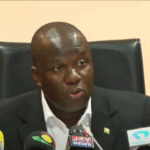
The institutional memory of pre-colonial African governance systems has suffered from both scholarly neglect and wilful misrepresentation. V. L. K. Djokoto’s Revolution offers a corrective — a meticulous examination of the Anlo military establishment that challenges prevailing assumptions about organisational capacity in 18th and 19th century West Africa.
What emerges from Djokoto’s research is a portrait of institutional sophistication that bears comparison with contemporaneous European military structures. The Anlo developed a tripartite command architecture — centre, left, and right wings — under unified ministerial oversight, with hereditary generalships providing continuity whilst permitting tactical flexibility. This was no ad hoc arrangement of tribal levies, but rather a standing military apparatus with designated headquarters, established supply chains, and codified strategic doctrine.
Archival rigour meets contemporary vision
The opening chapter features a rare archival photograph from the German Bremen Mission, immediately establishing Djokoto’s methodological seriousness. These missionary archives, often overlooked in favour of British colonial records, provide invaluable primary source material for reconstructing 19th-century Ghanaian institutional life. That a 30-year-old researcher has accessed and deployed such materials suggests both archival sophistication and a commitment to documentary evidence rather than received narratives.
The economics of warfare
The logistical dimension proves particularly instructive. Djokoto documents a comprehensive provisioning system that maintained three reinforced war camps simultaneously, managing the distribution of grain stores and munitions across multiple theatres of operation. The final distribution — one corn seed per combatant on the decisive day — suggests both quartermaster efficiency and an understanding of psychological timing that would not seem out of place in a modern military handbook.
Of equal interest is the economic structure supporting this martial infrastructure. Military service represented the apex of social capital within Anlo society — what Djokoto describes as “the most honourable form of civic achievement.” This created a self-sustaining system in which status incentives drove recruitment, whilst hereditary military castes preserved institutional knowledge across generations. The result was an effective mobilisation of human capital that permitted sustained territorial expansion.
Institutional continuity and strategic security
The classification of military intelligence as “Empire secrets” restricted to initiated elites demonstrates a sophisticated approach to information asymmetry. Meanwhile, the integration of religious ceremonies served dual functions: reinforcing unit cohesion whilst providing ideological justification for martial enterprise.
The longevity of individual reigns offers further evidence of institutional stability. King Tenge Dzokoto II’s 38-year tenure as Dufia (1873-1911) provided strategic consistency during a period of significant European colonial expansion. His father, General Dzokoto I, had previously demonstrated the system’s capacity for prosecuting extended military campaigns.
An unusual pedigree
That this work emerges from V. L. K. Djokoto (b. 1995) makes it all the more intriguing. The young author represents an uncommon synthesis of influences: cultural theorist, financier, and gallerist, he leads D. K. T. Djokoto & Co., an old-fashioned top-tier multi-family office established in 1950. It is precisely the sort of institutional longevity — spanning three-quarters of a century — that might attune one to the importance of heritage and continuity in governance structures.
Djokoto’s dual orientation — stewarding generational wealth whilst curating contemporary artistic experiences — informs his approach to historical research. Through his gallery work, he seeks to mobilise Ghanaians by weaving together African music, literature, and art into cohesive cultural narratives. Revolution extends this project into the historical realm, excavating narratives of institutional sophistication that have been systematically obscured.
There is something rather fitting about a financier writing military history. Both disciplines require an appreciation for logistics, strategic planning, and the management of resources across time. Djokoto brings this sensibility to his examination of Anlo military economics, identifying systems of capital allocation — human, material, and symbolic — that sustained empire-building over generations.
Contemporary relevance
For readers concerned with governance structures in emerging markets, the Anlo example offers instructive parallels. The system balanced hereditary privilege with meritocratic advancement, maintained operational security whilst distributing command authority, and created incentive structures that aligned individual ambition with collective strategic objectives.
Djokoto’s work arrives as African institutional history receives overdue scholarly attention. The continent’s contemporary challenges in state-building and security sector reform might benefit from examining indigenous governance models that demonstrably functioned over extended periods.
The broader implication is methodological. Too often, institutional analysis of pre-colonial Africa has been refracted through European typologies or dismissed as insufficiently “developed.” Revolution demonstrates the analytical value of examining these systems on their own terms, according to their own logic and within their own contexts.
What the Anlo created was not a primitive war-band, but a sophisticated military establishment with clear lines of authority, established logistics, strategic planning capacity, and ideological apparatus — in short, the institutional prerequisites of statecraft. That this achievement has been overlooked says rather more about historiographical blind spots than about the capabilities of the architects themselves.
For Ghana’s policy elite navigating contemporary diplomatic and economic challenges, understanding these historical precedents is not merely academic. It is a question of institutional memory, national identity, and the intellectual foundations upon which modern governance must be constructed.
That a 30-year-old financier and cultural theorist has taken up this challenge — armed with Bremen Mission archives and a researcher’s rigour — suggests a generational shift in how Ghana’s young elite engage with their heritage: not as museum piece, but as living intellectual capital with contemporary relevance.
Revolution by V. L. K. Djokoto merits serious attention from historians, political scientists, and anyone interested in the institutional architecture of pre-colonial African states.
- President Commissions 36.5 Million Dollars Hospital In The Tain District
- You Will Not Go Free For Killing An Hard Working MP – Akufo-Addo To MP’s Killer
- I Will Lead You To Victory – Ato Forson Assures NDC Supporters
Visit Our Social Media for More




